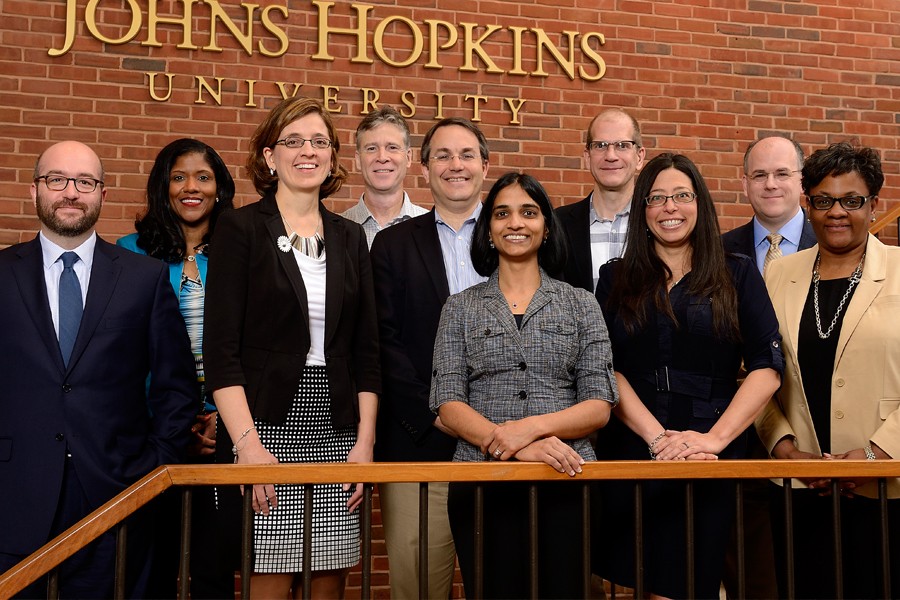Six faculty and staff members who regularly pursue mathematics, medicine, music, and more will stretch their administrative and leadership muscles this year as the newest group of Provost's Fellows.
Each of the fellows also will focus on an issue of strategic importance to Johns Hopkins, among them undergraduate and graduate education, digital education, undergraduate research, campus community, diversity, and management reporting and analytics. They will lead projects in these areas and make recommendations for future efforts.
Provost Robert C. Lieberman selected four faculty and two staff members as fellows this year, making it the largest cohort in the program's five-year history. They will typically spend one day of their workweek participating in activities with the Office of the Provost.
"I know firsthand how valuable this kind of leadership development program is," Lieberman says, citing his own career trajectory from professor to provost. "Professionals at research institutions such as ours are all but consumed by their day-to-day responsibilities. It is challenging to gain the experience necessary to make the successful transition. Through this program, we can help in ways that benefit not only our faculty and staff but also our entire Johns Hopkins community."
The Provost's Fellows Program was launched in 2011 to provide administrative leadership development for accomplished faculty and staff. Individuals must apply and are chosen for their experience, interest, and aptitude for academic leadership. They collaborate closely with vice provosts and commit to one year with the option to renew, depending on their activities and interest.
Previous fellows have moved into leadership positions at Johns Hopkins as well as elsewhere in academia, private industry, and government.
The 2016 cohort is as follows.
Richard J. Brown, who earned his doctorate in mathematics from the University of Maryland, is an associate teaching professor and director of undergraduate studies in the Krieger School of Arts and Sciences' Department of Mathematics. In his 11 years at Johns Hopkins, he also has worked on Krieger School or universitywide projects such as the Gateway Science Initiative, the PILOT Learning Program, and the Preparing Future Faculty Teaching Academy. As a fellow, he will pursue his interests in undergraduate and graduate education.
Aruna Chandran, who earned her master of public health and medical degrees at Johns Hopkins, is an associate scientist in the Bloomberg School of Public Health's departments of Epidemiology and International Health. She is currently coordinating the technical aspects of projects aiming to improve the public health and preventive medicine infrastructure in Qatar and Saudi Arabia, as well as serving as part of the evaluation team of two large HIV prevention and care demonstration projects being coordinated by the Baltimore City Health Department. As a Provost's Fellow, Chandran will focus on the campus community and diversity.
Sherri B. Flaks, a graduate of the University of Maryland, is director of enterprise data and analytics in IT@JH Enterprise Business Solutions; earlier, she served as applications security director and advanced senior information technology auditor. As a fellow, Flaks will concentrate on management reporting and analytics.
Ira Gooding, who earned a master of arts degree in English language and literature from the University of Maryland, is manager of the Open Education Lab in the School of Public Health's Center for Teaching and Learning. He has served Johns Hopkins for roughly 10 years in a number of roles, including as Public Health's open educational resources coordinator and the Massive Open Online Courses administrator for the Data Science Lab in the Department of Biostatistics. Gooding will draw on his extensive experience in the field of MOOCs to investigate ways to expand and improve digital education.
Michael J. Matunis joined the Johns Hopkins Bloomberg School of Public Health after earning a PhD from Northwestern University and completing postdoctoral training at the Rockefeller University. He is a professor in the Bloomberg School's Department of Biochemistry and Molecular Biology and has a joint appointment in the School of Medicine's Department of Cell Biology. During his fellowship, Matunis will focus on undergraduate research.
Larry Williams trained at the university's Peabody Institute, where he now teaches Conservatory chamber music and horn minor, and chairs the Preparatory Brass and Winds Department. He also is director of Adult and Continuing Education at Peabody. An active performer and clinician, Williams is a member of numerous orchestras and ensembles throughout the U.S. and is a Yamaha Performing Artist and Clinician. He will direct his efforts as a fellow toward faculty diversity.








